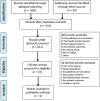Simulation training in non-cancer palliative care for healthcare workers: a systematic review of controlled studies
- PMID: 35516824
- PMCID: PMC8936877
- DOI: 10.1136/bmjstel-2019-000570
Simulation training in non-cancer palliative care for healthcare workers: a systematic review of controlled studies
Abstract
Background: The need for healthcare workers (HCWs) to have skills and knowledge in non-cancer palliative care has been recognised. Simulation is increasingly being used for palliative care training, offering participants the opportunity to learn in a realistic environment and fully interactive way.
Objective: The aim of this systematic review was to summarise and critically appraise controlled studies on simulation training in non-cancer palliative care for HCWs.
Selection: Medline, CINAHL, PubMed and Cochrane Library databases were searched using palliative care and simulation terms. Randomised controlled trials (RCTs), non-randomised RCTs and controlled before-and-after (CBA) studies were included. Two reviewers independently screened titles and abstracts and undertook full article review using predefined selection criteria. Studies that met the inclusion criteria had data extracted and risk of bias assessed using the Cochrane Effective Practice and Organisation of Care risk of bias criteria.
Findings: Five articles were included: three RCTs and two CBA studies. All studies assessed learners' palliative care communication skills, most studies evaluated learners' perception of change in skills and one study assessed impact on patient outcomes and learners' change in behaviour when applied in practice. There was variation in intervention content, intensity and duration, outcome measures and study design, making it difficult to compare and synthesise results.
Conclusion: There is a paucity of evidence to support simulation training to improve non-cancer palliative care. This review highlights the need for more robust research, including multicentre studies that use standardised outcome measures to assess clinician skills, changes in clinical practice and patient-related outcomes.
Keywords: Literature Review; Simulation Training.
© Author(s) (or their employer(s)) 2021. No commercial re-use. See rights and permissions. Published by BMJ.
Conflict of interest statement
Competing interests: SKP has acted as a consultant and/or speaker for Novartis, GI Dynamics, Roche, AstraZeneca, Guangzhou Zhongyi Pharmaceutical and Amylin Pharmaceuticals LLC. He has received grants in support of investigator and investigator-initiated clinical studies from Merck, Novo Nordisk, AstraZeneca, Hospira, Amylin Pharmaceuticals, Sanofi-Avensis and Pfizer. All other authors do not have any competing interests to declare.
Similar articles
-
Beyond the black stump: rapid reviews of health research issues affecting regional, rural and remote Australia.Med J Aust. 2020 Dec;213 Suppl 11:S3-S32.e1. doi: 10.5694/mja2.50881. Med J Aust. 2020. PMID: 33314144
-
Systematic reviews of the effectiveness of day care for people with severe mental disorders: (1) acute day hospital versus admission; (2) vocational rehabilitation; (3) day hospital versus outpatient care.Health Technol Assess. 2001;5(21):1-75. doi: 10.3310/hta5210. Health Technol Assess. 2001. PMID: 11532238 Review.
-
A comprehensive systematic review of the use of simulation in the continuing education and training of qualified medical, nursing and midwifery staff.JBI Libr Syst Rev. 2011;9(17):538-587. doi: 10.11124/01938924-201109170-00001. JBI Libr Syst Rev. 2011. PMID: 27819938
-
Education and training for preventing sharps injuries and splash exposures in healthcare workers.Cochrane Database Syst Rev. 2021 Apr 14;4(4):CD012060. doi: 10.1002/14651858.CD012060.pub2. Cochrane Database Syst Rev. 2021. PMID: 33871067 Free PMC article.
-
Interventions for improving medical students' interpersonal communication in medical consultations.Cochrane Database Syst Rev. 2021 Feb 8;2(2):CD012418. doi: 10.1002/14651858.CD012418.pub2. Cochrane Database Syst Rev. 2021. PMID: 33559127 Free PMC article.
Cited by
-
Identifying Research Priorities in Digital Education for Health Care: Umbrella Review and Modified Delphi Method Study.J Med Internet Res. 2025 Feb 19;27:e66157. doi: 10.2196/66157. J Med Internet Res. 2025. PMID: 39969988 Free PMC article.
-
Evaluation of IMproving Palliative care Education and Training Using Simulation in Dementia (IMPETUS-D) a staff simulation training intervention to improve palliative care of people with advanced dementia living in nursing homes: a cluster randomised controlled trial.BMC Geriatr. 2022 Feb 14;22(1):127. doi: 10.1186/s12877-022-02809-x. BMC Geriatr. 2022. PMID: 35164695 Free PMC article. Clinical Trial.
-
Building Palliative Care Capacity for Generalist Providers in the Community: Results From the Capaciti Pilot Education Program.Am J Hosp Palliat Care. 2023 Jul;40(7):737-746. doi: 10.1177/10499091221134709. Epub 2022 Oct 21. Am J Hosp Palliat Care. 2023. PMID: 36269212 Free PMC article.
References
-
- World Health Organization . WHO definition of palliative care. Available https://www.who.int/cancer/palliative/definition/en/ (accessed 9 Aug 2019)
-
- Lynn J, Adamson DM. Living well at the end of life: adapting health care to serious chronic illness in old age. White paper. RAND Health . 2003.
-
- Hofstede JM, Raijmakers NJ, van der Hoek LS, et al. Differences in palliative care quality between patients with cancer, patients with organ failure and frail patients: a study based on measurements with the consumer quality index palliative care for bereaved relatives. Palliat Med 2016;30:780–8. 10.1177/0269216315627123 - DOI - PubMed
Publication types
LinkOut - more resources
Full Text Sources
Miscellaneous

